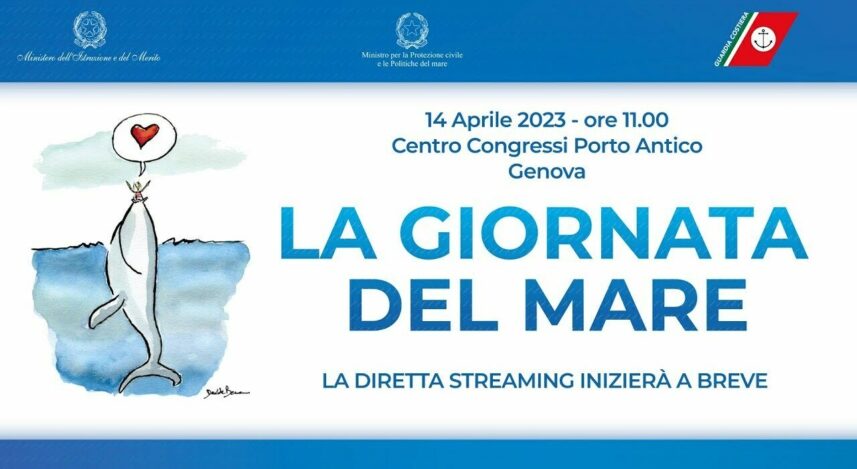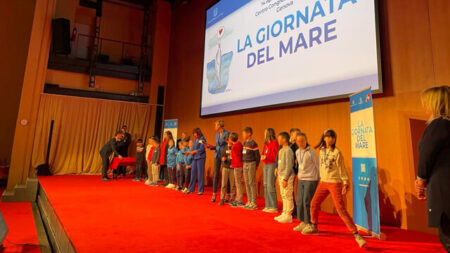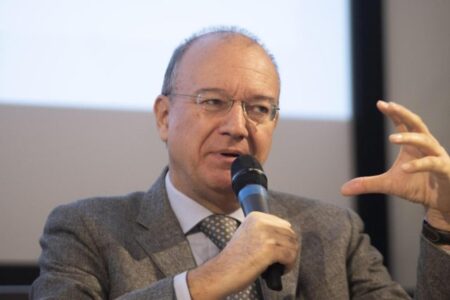I bring to all of you, students, Authorities and organizers, the greetings of the Ministry of Education and Merit, which immediately believed in the importance of establishing the Day of the Sea and Maritime Culture. This intervention of mine will not be ritualistic because something much deeper is at stake on this day, something that even involves the essence of our culture, of our model of civilization.

"We hang around the shores of the sea like frogs or ants around a pond", said Socrates in Plato's "Phaedo" and perhaps no sentence describes the intimate, inseparable link between Greece and the Mediterranean, between Western culture and the sea.
Thinking about it, if ours has been a culture of continuous research over the centuries, if it has become an open society and an economy of free trade, it owes much to the role of the sea as a moment of exploration of the unknown, as an occasion for encounters continuous and multiple exchanges. Along this path, Italy has given a fundamental specific contribution, just think of the very fruitful season of the Maritime Republics which, as President Carlo Azeglio Ciampi recalled in one of his famous speeches, "opened the ways of the world to Europe".
There is no globalization of goods and ideas without the marine element, the history of Genoa itself teaches us this, this magnificent city where we are today, the history of Venice, the history of many seaside cities in Italy. A whole story of which Italy has been a pioneer and driving force for a long time.
This, among other things, is the reason why one cannot be against globalisation, which is something very different from globalism understood as an ideology, it is rather about governing it. As we recalled, in fact, the relationship between the "polis" and the world, through the mediation of the sea, is something that immediately marks our civilization.

In recent decades, thanks to the affirmation of environmental sensitivity, an awareness has increasingly emerged: for this relationship to continue in all its richness and depth, it is necessary to take care of the sea. The image that Nietzsche gave in "Aurora" does not correspond to the truth, it is not true that "the sea lies pale and sparkling, it cannot say a word".
The sea has spoken to us a lot in recent decades, it has told us a lot about our carelessness, our waste, our old habit of living as in an eternal present, putting the theme of the future in brackets, which is basically that of the new generations , of you guys. Because they too deserve, you deserve too, especially you, to know that bond with the sea that has been handed down in our history since the origins of our civilization and above all it is not our right to take it away from them.
So, on Sea Day it is important to remember that authentic and no longer postponable ecologism is not an ideological ecologism or an enemy of the economy but, on the contrary, it is, for example, an ecologism that allows the sea to continue to be a driving factor of development.
This is why I find it very important that this year, in addition to the educational workshops, visits to research centres, interactive lessons on the marine environment and sea trades, our students have the opportunity to visit the Luni Helicopter Station, to example, and the Naval Units of the Navy, daily engaged in the sustainable enhancement and defense of the sea in all its forms, custodian of seafaring culture.
The "Citizenship of the sea" competition also has a particular significance in this sense. Born from the collaboration between the Ministry of Education and Merit and the General Command of the Port Authorities and the Coast Guard, the competition aims to make students active citizens who are aware of the sea and the environment, guardians of the conservation and enhancement of a vital asset for the planet, as well as speakers of a culture of which, historically and traditionally, the sea is the bearer.
The theme chosen for this year - "The sources of energy in times of crisis and their sustainability", with particular reference to renewable sources and their effects on the marine and coastal environment and on the communities living near the sea - intercepts a key contemporary issue.
In addition to the environmental crisis, it was the war that unfortunately returned to the heart of Europe to make us understand how vital it is today to diversify energy sources, not only from the point of view of suppliers but also from the type of energy.
We recall that seas and oceans cover about 70% of the earth's surface. An inexhaustible energy reserve, with enormous potential: the International Energy Agency estimates that the energy potential of the sea, throughout the world, can generate between 20 and 90 terawatt hours of electricity per year. We are talking about terawatt hours, or billions of kilowatt hours.
Again according to the International Agency, by 2050 marine energy will spread predominantly in the Old Continent, satisfying 10% of electricity consumption, with an estimate, among other things, of as many as 40 additional jobs. Here, then, is a virtuous case of sustainability: development, in order to be sustainable, must first of all be development.
I'm obviously not a technician capable of going into the details of these forecasts, but I know that, even valued as a source of energy, the sea would return to its primary vocation, which we Italians know very well: that of being the cradle of civilization.
Because, even if in the meantime our horizon has expanded far beyond the Mediterranean, it has expanded to the oceans, we are still, as Socrates said, "frogs around a pond".
